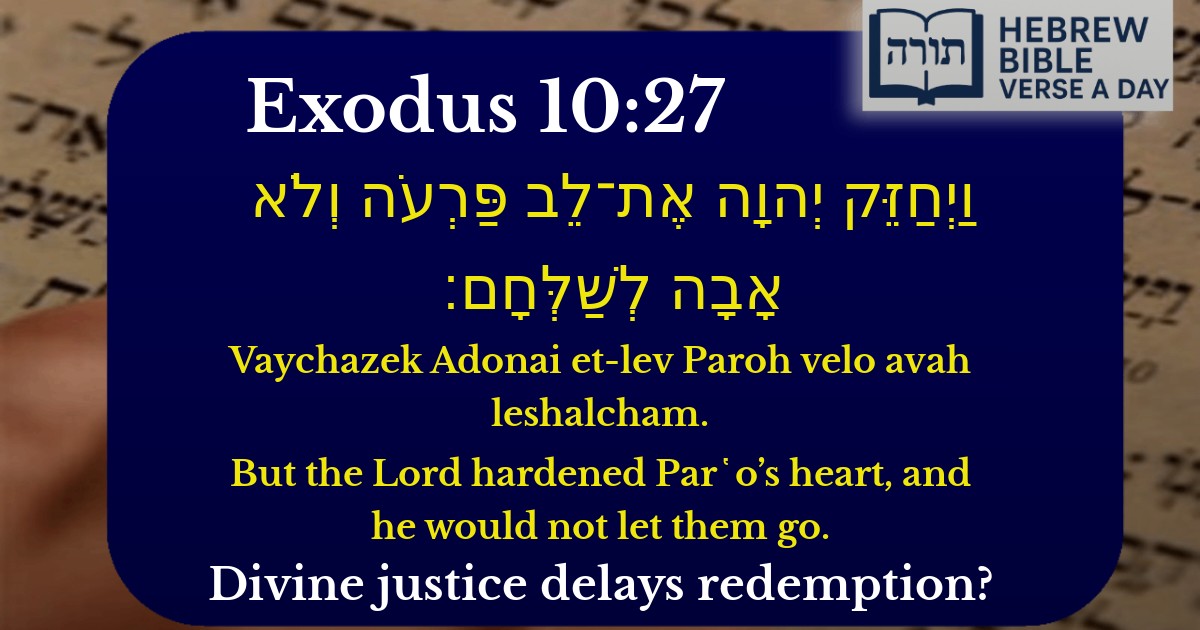Join Our Newsletter To Be Informed When New Videos Are Posted
Join the thousands of fellow Studends who rely on our videos to learn how to read the bible in Hebrew for free!
Hebrew Text
וַיְחַזֵּק יְהוָה אֶת־לֵב פַּרְעֹה וְלֹא אָבָה לְשַׁלְּחָם׃
English Translation
But the Lord hardened Par῾o’s heart, and he would not let them go.
Transliteration
Vaychazek Adonai et-lev Paroh velo avah leshalcham.
Hebrew Leining Text
וַיְחַזֵּ֥ק יְהֹוָ֖ה אֶת־לֵ֣ב פַּרְעֹ֑ה וְלֹ֥א אָבָ֖ה לְשַׁלְּחָֽם׃
וַיְחַזֵּ֥ק יְהֹוָ֖ה אֶת־לֵ֣ב פַּרְעֹ֑ה וְלֹ֥א אָבָ֖ה לְשַׁלְּחָֽם׃
🎵 Listen to leining
Parasha Commentary
📚 Talmud Citations
This verse is quoted in the Talmud.
📖 Berakhot 9a
The verse is referenced in a discussion about divine hardening of Pharaoh's heart and human free will.
📖 Sanhedrin 105b
Mentioned in the context of discussing Pharaoh's stubbornness and the plagues of Egypt.
📖 Exodus Rabbah 13:3
Used in a midrashic discussion about God's role in hardening Pharaoh's heart.


The Hardening of Pharaoh's Heart
The verse states: "But the Lord hardened Pharaoh’s heart, and he would not let them go" (Shemot 9:12). This concept appears multiple times in the Exodus narrative, raising theological and ethical questions about free will and divine intervention.
Rashi's Explanation
Rashi (Shemot 7:3) explains that Hashem hardened Pharaoh’s heart after Pharaoh had already repeatedly chosen evil of his own free will during the first five plagues. By the sixth plague, Pharaoh had so entrenched himself in wickedness that Hashem removed his ability to repent, ensuring he would face the full consequences of his actions. This aligns with the principle of "measure for measure" (middah k'neged middah)—since Pharaoh hardened his own heart initially, Hashem allowed that hardness to remain.
Rambam's Perspective
In Hilchot Teshuvah (6:3), the Rambam (Maimonides) addresses the philosophical dilemma, stating that while Pharaoh sinned grievously of his own volition, Hashem withheld the opportunity for repentance as a punishment. This does not negate free will in general but serves as a unique divine decree for Pharaoh due to his extreme cruelty.
Midrashic Insights
Moral and Theological Implications
The hardening of Pharaoh’s heart underscores the severity of willful evil and the eventual removal of divine mercy for those who persistently reject righteousness. It also highlights that Hashem’s justice operates on both individual and historical levels—Pharaoh’s obstinacy led to the complete fulfillment of the plagues, ensuring the redemption of Bnei Yisrael would be unmistakably miraculous.
Conclusion
Traditional Orthodox Jewish sources view this verse not as a denial of free will but as a unique divine response to Pharaoh’s own choices. The hardening served both as punishment and as a means to reveal Hashem’s sovereignty to the world.